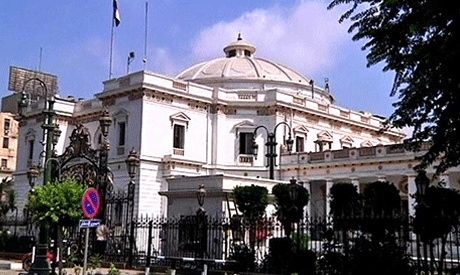
Egyptian house of Parliament in downtown Cairo (Photo: Reuters)
Egypt’s parliament will discuss two new draft media laws in a plenary session on Monday, with the first aiming to set up a syndicate for workers in audio-visual media, while the second seeks to regulate media outlets in general.
The discussion comes after the two draft laws were revised by the State Council and approved in three hearing sessions by parliament's Media, Culture and Antiquities Committee last week.
Committee head Osama Heikal told reporters that the two draft laws will be debated in a plenary session on Monday after revision by parliament's constitutional and legislative affairs and the budget committee.
Heikal said that the first 89-article draft law aims to set up a syndicate for the first time for audio-visual media workers, especially in the field of television and radio.
The second law aims to create three regulatory bodies that will oversee all media outlets in Egypt.
According to Monday's schedule of debates, parliament will discuss two laws on the Syndicate of Egyptian Media People – the first drafted by the government and the second by 60 MPs led by independent deputy Tamer Abdel-Kader.
Also on Monday, parliament will discuss two laws on the “Institutional Regulation of the Press and the Media.”
The first 90-article draft law was prepared by a special commission composed of both independent and government-affiliated experts in media law, and the second was drafted by 101 MPs led by independent deputy and high-profile journalist Mostafa Bakri.
Heikal said that the draft law on the Syndicate of Egyptian Media People stipulates that all those who work in the field of television and radio channels, including TV anchors and directors, should be university graduates and have a proven record in television and radio media activities.
The syndicate will also be in charge of defending its members, improving their living conditions and drafting a code of ethics for all those who work in audio-visual media activities.
“Once the legislation on the three media bodies is ratified by President Abdel-Fattah El-Sisi and their board members are named, the committee will begin discussing the second law on media and press conditions,” Heikal said.
If the law on the three media regulatory bodies is approved by MPs on Monday, the president will be expected to issue a decree within two weeks on the forming of their boards.
“Each board will comprise 13 members; three of whom are to be selected by the president [including the board heads],” says Article 32.
The three bodies would be the Higher Council for Media Regulation (HCMR), the National Press Organisation (NPO) and the National Media Organisation (NMO).
The NPO, according to articles 27 and 84, will replace the current Higher Press Council, taking charge of supervising state-owned press organisations. The NPO will also be responsible for selecting board chairmen and the editors of their affiliated publications.
The NMO will replace the current Radio and Television Union (RTU), and will be mandated with overseeing state-owned audio-visual media, radio, and digital media institutions in a manner that guarantees their independence, professionalism and profitability.
The NMO will also be tasked with reforming the giant Radio and Television Union and turning it into a profitable business.
The HCMR will regulate all media outlets, whether audio-visual, digital or print – whether public or private – in coordination with the NPO and the NMO, according to Article 1.
The HCMR will also take charge of licensing media outlets and drawing up a code of media ethics, with a focus on respecting public morals and national security concerns, by which all media organisations – public, private or partisan – must abide.
Short link: